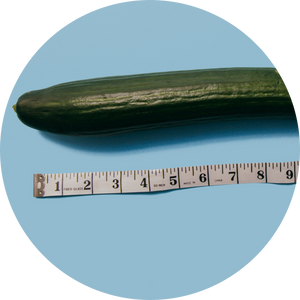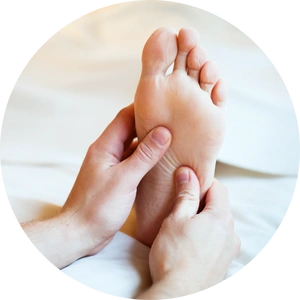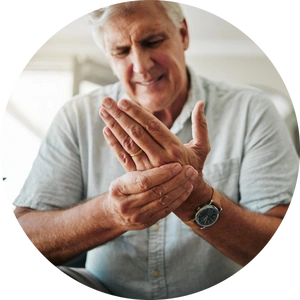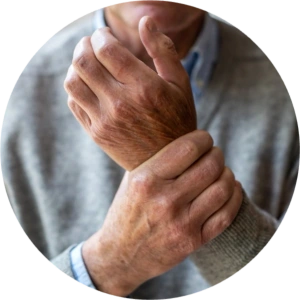Knee pain can be a nagging and sometimes debilitating issue, impacting your daily life and activities. To effectively manage and alleviate knee pain, it's crucial to understand the various factors that can lead to discomfort. In this comprehensive guide, we'll uncover the many factors that can contribute to knee pain.
Common Causes of Knee Pain
To begin, here are some of the more common reasons for knee pain.
Injury or Trauma
Injuries to the knee, often resulting from accidents or sports activities, are a common cause of knee pain. Understanding these injuries is vital for proper treatment and recovery.
-
Sprains and strains. These injuries often occur during sports or strenuous activities. A sprain is a ligament injury, while a strain involves muscles or tendons. It can result in pain, swelling, and difficulty moving your knee.
-
Fractures. A broken bone in the knee can be a source of severe and sudden pain. Fractures often require immediate medical attention and may lead to long-term discomfort if not treated promptly.
-
Meniscus tears. The meniscus is a wedge-shaped cartilage that cushions the knee joint. Tears in the meniscus are common and can lead to pain, swelling, and stiffness in the knee.
-
Ligament tears. Injuries to crucial knee ligaments, such as the ACL, MCL, or PCL, can cause instability and significant knee pain. These injuries often require specialized medical care and rehabilitation.
Overuse or Strain
Overuse or strain on the knee can result from repetitive movements, excessive weight, or medical conditions. Identifying these causes and their effects on the knee is vital for appropriate treatment and long-term knee health.
-
Repetitive movements. Activities like running, cycling, or jumping can strain the knee over time. This type of pain is usually a result of overuse, leading to discomfort during and after physical activities.
-
Excessive weight. Carrying extra body weight can put increased pressure on the knee joint, causing pain — especially when walking or standing for extended periods.
Arthritis
Arthritis, a common cause of chronic knee pain, encompasses conditions like osteoarthritis and rheumatoid arthritis, and more. This can affect the knee joint and lead to stiffness, pain, inflammation, and reduced mobility.
-
Osteoarthritis (OA). OA is caused by damage or breakdown of joint cartilage between bones. It's a common contributor to knee pain in older adults and often results in stiffness and reduced range of motion.
-
Rheumatoid arthritis (RA). RA is an autoimmune condition that can affect the knee joint, leading to inflammation, pain, and possible joint damage. Early diagnosis and treatment are essential to manage this condition effectively.
-
Gout. High uric acid levels in the blood can lead to gout. When uric acid crystals form in the knee joint, it results in acute pain, redness, and swelling.
Tendonitis
Tendonitis involves the inflammation of tendons in the knee, leading to localized pain and discomfort.
-
Patellar tendonitis. Also known as “jumper’s knee”, patellar tendonitis is the overuse of the patellar tendon, which connects your kneecap to the shinbone. It results in pain just below the kneecap.
-
Iliotibial (IT) band syndrome. This is the inflammation of the IT band. It can lead to outer knee pain, especially for runners.
Specific Conditions Linked to Knee Pain
Knee pain can also be caused by specific conditions like bursitis, Osgood-Schlatter disease, plica syndrome, and more. Let’s look at the details of these conditions and how they relate to knee discomfort.
-
Bursitis. Bursitis involves the inflammation of the bursae, small fluid-filled sacs around the knee joint. When these sacs become irritated or swollen, they can cause localized pain and discomfort.
-
Sciatica. Although primarily a lower back condition, sciatica can radiate pain down the leg, affecting the knee.
-
Osgood-Schlatter disease. A common cause of knee pain in young adults, this condition is linked to overuse and growth spurts.
-
Plica syndrome. Plica syndrome involves irritation of the synovial tissue around the knee joint, causing pain and discomfort.
-
Chondromalacia patellae. Softening of the cartilage beneath the kneecap can result in pain, especially during activities that require bending the knee.
-
Runner's knee (patellofemoral pain syndrome). Common among athletes, runner's knee is associated with pain around or behind the kneecap.
When to Seek Medical Advice for Knee Pain
If you’re experiencing persistent or severe knee pain, or if it’s interfering with your daily activities, it's time to consult a healthcare professional. They can provide a precise diagnosis and recommend suitable treatment options.
At our parent company LifeMD, board-certified doctors and nurse practitioners are available to help you find answers to your knee pain. Whether you need an assessment of your symptoms or a referral to a specialist, licensed healthcare providers are just a virtual appointment away and ready to provide personalized guidance. You can conveniently schedule an appointment from the comfort of your home and take the first step toward addressing your knee pain and improving your overall well-being.












